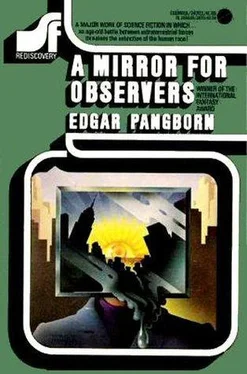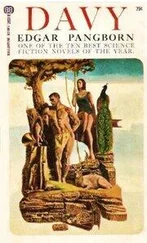So they had followed him last night. Followed, but hadn’t done anything. Until now. Too busy maybe: Max and his boys might not be having an easy time over the death of Daniel Walker, with a New York police force which they say has been incredibly honest for the last thirteen or fourteen years. “Why, Miriam?”
“Why!” Her neat shoulders rose and fell. “After all! We’re engaged. As you know. I could ask, why’s it any of your business?”
“He came to me. That made it my business.”
“Really! He’s of age. And this happens to be Party business.” It was already open war. I said: “I still want to know why.”
“You’re not a member. What right’ve you got to know?”
“He’s not a member either.” I was making my voice reasonably strong, hoping it might carry through the thick door.
“Needn’t shout.” She was showing the whites of her eyes. “That’s got nothing to do with it, Mr. Meisel. Don’t be so difficult.”
“All right. Come in. But do you mind if I look in your handbag?”
“My — handbag?” I saw then that she used a trace of rouge: her cheeks displayed unhealthy little roses as the blood drained out of them. Her right hand darted to the blue bag, and my hand closed over hers before she could open the catch. It could be tough for me, if she screamed. I didn’t think she would, and I was right. She let the bag go, stood away with fingers pressed to her bright mouth. It was there, in the bag. A .22, like a toy but big enough. I hate the things anyway. I made sure of the safety, dropped the gun in my hip pocket, and returned the bag. “I carry it for protection,” she said, pathetic now. “Have to go around — queer places sometimes.” The pathos became precariously held dignity. “I’ve got a license for it. I can show you. It’s here — somewhere.” As she groped in the bag a tear spilled and rolled to her mouth corner. Uncalculated. So was the sniff, the flirt of her little tongue to her mouth corner while her hands were flutteringly busy. “You don’t have to be so damn mean— ”
“Keep the license,” I said, “and I’ll give you back the ordnance, when you leave.” I punched the bell a couple of times and thrust my key noisily in the lock. “Coming in?” Impolitely I marched in ahead of her.
Sharon was in the armchair by the window with her feet tucked under her. Abraham at least had not noticed our voices out there. He sat on the floor beside her, full of quiet, drowsily conscious of her hand in his hair, not of much else maybe. Sharon smiled and murmured: “Knew it was you so I didn’t get up. We’ve talked ourselves into a coma, and—”
Then Miriam stepped in behind me and said: “Oh.”
I waved my hand, a foggy human gesture that tried to say this wasn’t my doing. At the sound of Miriam’s exclamation Abraham looked around but didn’t rise at once, only stared in shock. When he did stand up Sharon laced her fingers in his, and I could see he wanted that. Sharon was intent, outwardly cool. So is a good artilleryman getting ready for a big one.
Miriam had probably never looked prettier herself. She had won her small brush with tears: they only swam in her eyes without falling. Trim and exquisite in her blue trousers, white fur jacket, a little sparkling something-or-other of a hat on the white shining of her hair, she was a gentle pin-up deeply wronged. Sharon said neutrally: “Miss Dane, I think?”
Miriam tried to dismiss her with one contemptuous flickering glance. “Abe, don’t on any account let me disturb anything, but Bill Keller wants to see you, I do mean right away.”
“I’m sorry.” Abraham spoke evenly; painfully conscious of his own words, but there was quiet in him; I knew it. “I don’t want to see him.”
“What!”
“I’m sorry, Miriam. That’s how it is.” I leaned back feebly against the wall, an old man obscurely minding his own business. That would do, what Abraham had said. The next few minutes were not going to be nice, but the boy needed no help. “If you see Bill, you might as well tell him that. I’m not going back there, Miriam, not seeing any of them again.”
I don’t believe Miriam had been braced for anything like that. She had come looking for a confused, easily managed boy. She stared into her hands, flushed and paled, unable to conceal her growing sense of defeat and a growing panic which, I sensed, had little to do with her relation to Abraham. After a few false starts she said softly: “Abe, there’s such a thing as loyalty. Or wouldn’t you know?”
Abraham nodded. “They’ll have to think of me as a heel, Bill and Mr. Nicholas and the rest. That’s all right. I do myself, but for a different reason: I gave my loyalty where I should’ve known it couldn’t remain. I’m not going back, Miriam.”
Sharon said: “There are other loyalties, Miss Dane. Your leader Joseph Max is what I’d have to call disloyal to his fellow men.”
I didn’t think Miriam’s policy of ignoring Sharon would work much longer. But she went on trying it. Staring at Abraham and then at the ring on her left hand, she whispered: “None even to me, apparently….”
Sharon said: “People change.”
Even that did not make Miriam look at her. It was like another answer to the same thing when Abraham said: “Dr. Hodding was already broken when the Party bought him — wasn’t he, Miriam? Sick, turning to alcohol dreams for escape because even the good work he did at the Wales Foundation had alarmed him, alarmed part of him anyway. Miriam, tell me this: why did a thing supposed to be an openly registered political party want to subsidize a man to invent a new disease—”
“That’s a lie! It wasn’t like that, Abe!”
“It’s what happened.” Abraham shook his head. I could see pain growing in the deep shadow of his eyes, pain and perhaps a hint of uncertainty. “You were there on the roof garden, Miriam. Once you told me yourself that nothing happens in the Party without your knowing all about it.”
“But you don’t understand. We didn’t know what Hodding
“Didn’t know!”
“No, we did not. He — I could tell you — all right, I will tell you, though I wasn’t supposed to….”
Sharon noticed her free hand had become a fist. She relaxed it carefully. She said: “Yes, do.” And still Miriam managed to ignore her.
“Abe, Max has only just found out what Hodding really was, only just this morning. That’s why you’ve got to come back. Nicholas says you were alone with Hodding, heard some of his talk. Max has got to see you, hear about it directly from you — you owe us that much, seems to me. And Bill, Bill Keller is sick, Abe. He broke down. We didn’t have any sleep, any of us, and Bill is sick, can’t get hold of himself, keeps asking for you….”
She could see as well as I did that it made him waver. Perhaps she didn’t see Sharon’s hand, which was saying more than I could have said with any verbal interference. “Why, Bill’s never sick—”
“But he is! I just came from him. Oh, Abe, he’s done so much for you — and nobody’s asking you to do any Party work, just to come and see him, talk to him. Did he ever ask you for any help before—”
“Miriam, if he’s sick it’s not going to help him to see me, when I’ve rejected the things he believes in. And you haven’t told me what you started to…. What is Dr. Hodding, as of this morning?”
“That’s a nasty thing to say.” Miriam had dignity when she wanted to use it. “I don’t think your present company’s improved you, Abe, do you mind my mentioning it? Hodding’s what he always was, only we didn’t know it. All right — and you’d better listen. You won’t like it, maybe you’ll refuse to believe what we finally got out of that poor crazy old man—”
Читать дальше












